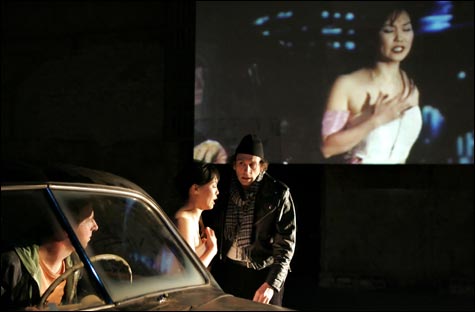
IT’S NOT FOR PURISTS, but Jeune Lune’s existential jalopy is a strong argument for carpooling. |
In 1665, when it made a brief appearance before being suppressed for a couple of hundred years, Molière’s Don Juan was a “machine play” — noted for its elaborate stage mechanics. In Don Juan Giovanni, a 1994 amalgamation of Molière’s play and Mozart’s Don Giovanni into a philosophic confection with incidental music of the spheres, the machine is a functioning vintage Plymouth on a road trip to nowhere — it travels in circles, like the bike and the wheelchair that also figure in this Sisyphean sex addicts’ journey. Given the source material, the car should probably be a Citroën or a Fiat, but who’s quibbling? This ingenious “opera play” imported by the American Repertory Theatre from the Minneapolis-based Théâtre de la Jeune Lune isn’t without flaws. The updating of the Molière transfers the antihero’s blatant blasphemy to a contemporary landscape in which it’s hardly as shocking as it insists it is. There are segments of the rewritten Don Juan that, sans the ravishing Mozart, fall flat. And Mozart’s lothario seems to come and go at random. But as a whole, Jeune Lune’s throwing of the two lovers into one existential jalopy with singers popping and Mozart springing from every orifice, including windows and sun roof, is a strong argument for carpooling.
The first thing for purists to get over is that this is neither Don Juan nor Don Giovanni. (Peter Sellars may have set Don Giovanni in Spanish Harlem, but it was the opera.) Jeune Lune pilfered the two classics for its own purposes — and was sufficiently pleased with the result that it repeated the experiment in its 2003 Figaro, a marriage of Beaumarchais’s La mère coupable to Mozart’s Le nozze di Figaro with which Don Juan Giovanni plays in rep (at the Loeb Drama Center through October 6). The DJG text, which from the sound of it has some improvisation at its roots, is by long-time Jeune Lune member Steven Epp, who conceived the work with director Dominique Serrand and plays a marvelously ruffled Sganarelle to the ruefully French roué of Serrand, who also designed the big, white Bauhaus-y frame of a set and the bright-lights-to-primal-landscape video design.

Epp and Serrand, as the antic banana and debater libertine of Molière’s play, handle most of the slapstick and insurrectionary philosophic canoodling while their eight fellow performers, some of whom ART-goers will remember from the chamber Carmen that Jeune Lune brought to the Loeb in 2005, both act and sing — for the most part superbly (even when supine), their gorgeous arias, duets, and ensembles accompanied by an excellent quintet spearheaded by pianist and music director Barbara Brooks. She traveled with the performers and the Plymouth from Minneapolis; her first-rate pick-up quartet, tucked onto a Loeb side stage and rendering every Mozartian delicacy, comprises violinists Daniel Stepner and Julie Leven, violist Laura Jeppesen, and cellist Guy Fishman. The musical adaptation is by Bradley Greenwald, who is also the production’s robust Leporello.
In this reinvented work, which is punctuated by Mozart’s sublime melodies minus the recitative, Molière’s louche, aging Don Juan and his hyperactive sidekick/servant encounter Mozart’s younger libertine and his valet at a drive-in movie. Actually, Mozart’s characters are the drive-in movie, the opera’s initial scuffle among Don Giovanni, Donna Anna, and her father, the Commendatore, played out both on stage and on an upstage screen as Don Giovanni flees an attempted seduction and is pursued by the avenging dad — who is accidentally bumped off by the Plymouth and hauled away on a gurney. Needing a means of escape, Don Giovanni and Leporello hop into the car, causing Sganarelle no little trepidation until Leporello’s catalogue of his master’s conquests (“Madamina, il catalogo è questo”) convinces him that the encounter is “like meeting long-lost cousins.” I question whether you can take the iconic seducer — who has been singular for 700 years — and double his pleasure without diluting the myth of Don Juan. But that’s a given here. It also goes without saying that the surtitles (credited to Epp) that accompany the music, sung mostly in Italian, are not lifted straight from Lorenzo da Ponte, who doubtless did not write, “In France, all the woman are doable,” or refer to “desperate housewives.”
In its structure, DJG follows the more episodic Don Juan, with one of the French play’s country wenches, Charlotte, doing double duty as Zerlina, the peasant girl seduced by Don Giovanni (“Là ci darem la mano,” here removed to the back seat of the car, Christina Baldwin’s crystalline high notes motivated by the activity taking place beneath her skirt). A hapless gas-station attendant named Peter stands in for a number of Molière’s minor characters as well as for Masetto, the peasant who loves Zerlina. And, boy, does this guy — though he’s the one left in the dust by the Plymouth, often having been walloped by a car door — get taken for a ride. Here, as elsewhere, the physical comedy undertaken by Jeune Lune is brutally convincing. Thus it is to Dieter Bierbrauer’s battered Peter that Baldwin’s breezy Charlotte, dismounting from her bike, croons Zerlina’s poignant aria of comfort, “Vedrai, carino.” Also touching is Bierbrauer’s rendition of the abandoned Peter’s lament (“Dalla sua pace”).